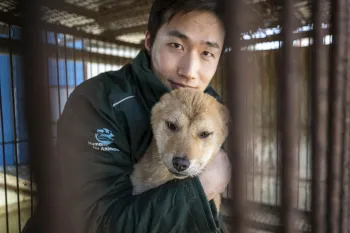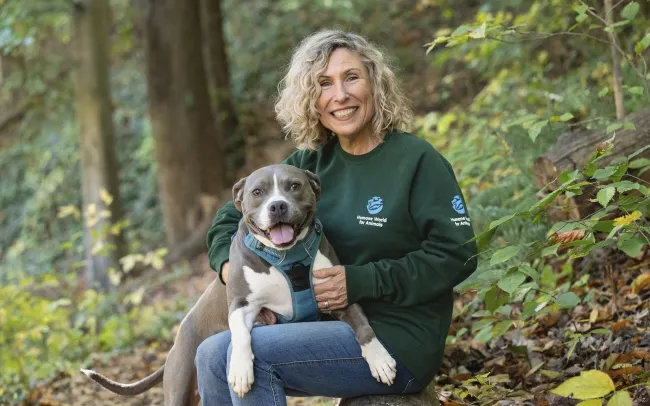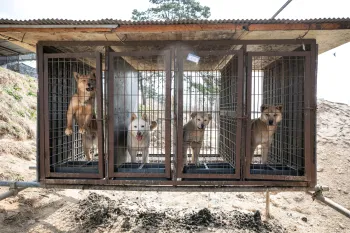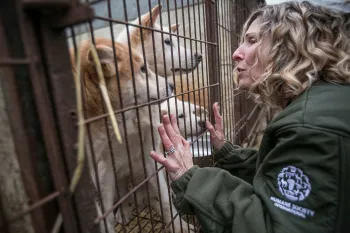A decade ago, when our team at Humane World for Animals Korea (known then as Humane Society International/Korea) began its breakthrough efforts to close dog meat farms in South Korea, we were told that achieving a ban on the dog meat industry in the country would be impossible.
Our new report, “Ending the Dog Meat Industry in South Korea: Building a more compassionate society toward dogs,” tells the story of achieving the impossible for dogs in South Korea.
When we began this work, the sheer scale of animal suffering in the industry was hard to even fathom. And the urgency of the suffering was palpable as soon as anyone set foot on one of the more than 17,000 dog meat farms that existed at the time. I joined our teams when they conducted rescue operations and dog meat farm closures. The firsthand experience of seeing the rows and rows of rusty cages containing dog after dog after dog peering out in desperation will never leave my memory. I remember noticing that some dogs were strong enough to stand up and wag their tails, so closely resembling my own dog at home, eager for love and affection. But others were perhaps even more heartbreaking—those who remained huddled in the corners of their cages, some of them emaciated, as if they had already given up on living their lives.
And yet dog farming felt so entrenched in the country, even though surveys indicated that less than half the population ate dog meat. Government statistics suggest there were more than 17,000 dog farms when we started our Models for Change program. This program has closed 18 dog meat farms, rescuing nearly 2,800 dogs, and helped dog farmers identify new livelihoods and transition to a more humane way of making a living; this was something that many of them, weary from a rapidly disappearing market in which it was harder than ever to make a profit, welcomed with open arms. But given the scale of dog farming, the program seemed to some too idealistic—any rescues and closures from that program just a drop in the bucket.
Flash forwards a decade, and South Korea has passed a ban on the dog meat industry. And guess what? It is the approach that our Models for Change program modelled, demonstrating how the closure of the country’s dog farms could be achieved by providing support to farmers as they transitioned to new livelihoods. And this is what has been underway in the country since the ban passed in January 2024. Now that the ban will come into full effect in Feb. 2027, South Korea has demonstrated to the world that it is possible to ban the dog meat industry while helping those involved in the trade. This milestone has been achieved during a time of shifting societal views, as the consumption of dogs is largely seen as an unacceptable practice in modern South Korean society.
This change is part of a broader global trend, with the rise in pet ownership, the influence of social media and the increasing recognition of animal sentience prompting more compassionate attitudes toward animals. The younger generation has been at the forefront of this movement, demanding government action to end the dog meat industry. Although challenges remain in other countries across Asia where the dog meat trade persists, including traditional consumption in some local communities and the economic interests tied to the dog meat trade, these challenges can be addressed. Traditions are not static; they evolve over time, and everyone has a part to play in creating a kinder and more compassionate world.
It is still a hard fact that each year millions of dogs and cats continue to suffer in the dog and cat meat trade across Asia. They are stolen from their families, snatched from the streets or kept on cruel fattening farms and subjected to unimaginably suffering. Beyond the cruelty, the trade poses serious public health risks, including the spread of rabies and other deadly diseases, while undermining regulations on food safety, animal welfare and cross-border trade.
But South Korea’s success provides a powerful example in how political will, shifting cultural values and strong partnerships can combine to achieve lasting change. By drawing on both local experience and global lessons, our new report offers a model for ending the trade in countries where it still exists. And there are promising signs of change: For example, a new survey conducted in Dalian, a major city in China, found that 95% of citizens support legislation to protect companion animals and 99% support Dalian banning dog and cat meat.
South Korea has shown the world that it is possible to end the dog meat industry in a way that respects culture, protects livelihoods and creates a more compassionate society. We thank everyone who has helped to make the end of South Korea’s dog meat industry possible: the Korean public, policymakers, celebrities and fellow animal welfare organizations, our amazing dog adopters and our faithful supporters. We look forward to the day soon when there are no dogs consumed for their meat in South Korea, and eventually, the world.




